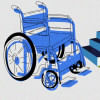A school that supports children with special needs

Bristi Akter has no legs since birth. Now 13, the Kishoreganj girl showed an increasing interest in studies and her family had her admitted to a local school. But her peers would often tease her about her condition, forcing her family to stop sending her to the school in the district's Bhogpara in Katiadi upazila.
Her father, an auto-rickshaw driver, was worried for her.
Sohrab Mia, her father, said, "I used to take her to the school in a wheelchair every day. People would ask me what Bristi will do after completing her studies, as she is unable to walk."
He later came to know about a specialised school named Mrittika Pathshala and Rehabilitation Centre in Kishoreganj. The school is in Gothalia village of Pirijpur union under Bajitpur upazila, about two kilometres from their home.
Last year, Sohrab had Bristi admitted to this school, where she is now studying in class one.
Like Bristi, 149 children with varying degrees of disabilities are studying here. Of them, 106 have neurodevelopmental disabilities, including autism. The rest 43 have physical disabilities, said Noor-e-Hayat Afsana, headteacher of the school.
The school is fully free and runs mostly on small donations from private citizens. From Sunday through Wednesday, students, mostly accompanied by their guardians, come for lessens from 10:00am to 2:00pm. Students also get a free mid-day meal, often Khichuri.
Currently, the school has students with five types of disabilities -- intellectual disabilities, cerebral palsy, down syndrome, autism, and multiple disabilities. The focus here is more on various life skills as well as hands-on training on basic computer skill, vegetables farming and handicrafts.
Jannatul Begum comes here with her 14-year-old daughter, Mohona, from Gozaria of Sorarchor upazila of the district.
"My daughter has no legs and hands since birth. I took it as a challenge, and I bring her here for her lessons," she told The Daily Star on the school campus last week.
The school was established in 2015 in a makeshift structure by M Mahbubur Rahman Bhuiyan, a development worker currently based in Dhaka. Originally from Kishoreganj, Mahbubur himself has physical disability since a polio attack affected his left leg in his childhood.
In 2020, the school was shifted on its current campus, a four decimal of land donated by Dr Meherul Huda, who now lives in Australia. Originally from Kishoreganj, Dr Huda also donated some money to build the tin-shed, brick-wall school having eight rooms.
Currently, there are nine teachers, one psychologist, and six staffers in the school, the headteacher said.
"People with disabilities face different problems. Stigma and discrimination are most common for them. Basically, we try to teach them to lead a normal life, as much as they can. The problem is we cannot do much. For example, many of these children need transport, but we cannot provide it," she said.
The school has no fixed income other than Tk 10,000 per month in rent from an auto-rickshaw that the school owns. Also, a number of private citizens make some small donations. As a result, the teachers and staffers don't even get paid regularly, said Afsana.
Mahbubur, who started the school, said persons with disability face serious discrimination, and education is the only way to eliminate this discrimination.
"I set up this school to ensure their right to education," he said.
Speaking by phone from Australia, Dr Huda stressed the need for support for initiatives meant to improve the lives of children with disability.
"Fund allocation has to be increased to meet their special needs for education, health and integration into society, enabling them to live a meaningful life as citizens," he said.

 For all latest news, follow The Daily Star's Google News channel.
For all latest news, follow The Daily Star's Google News channel. 






Comments